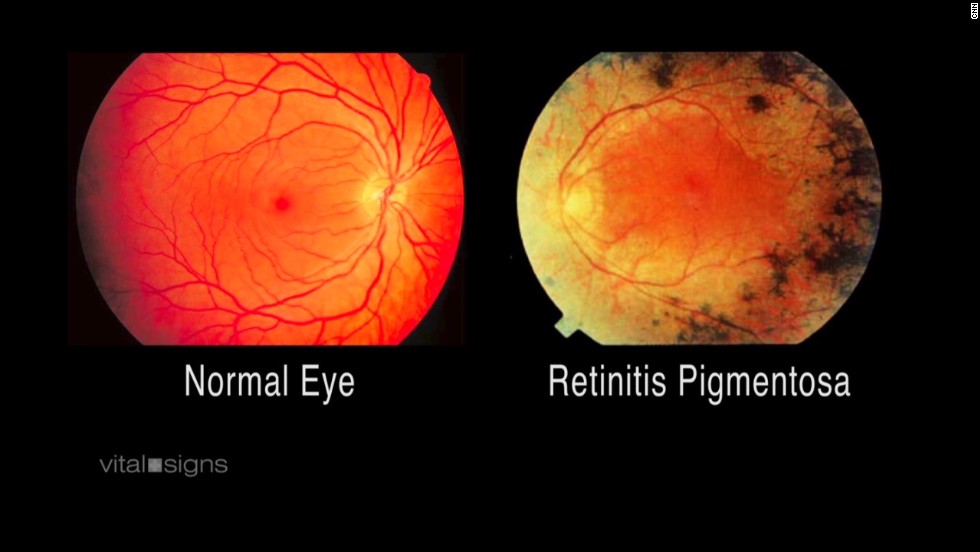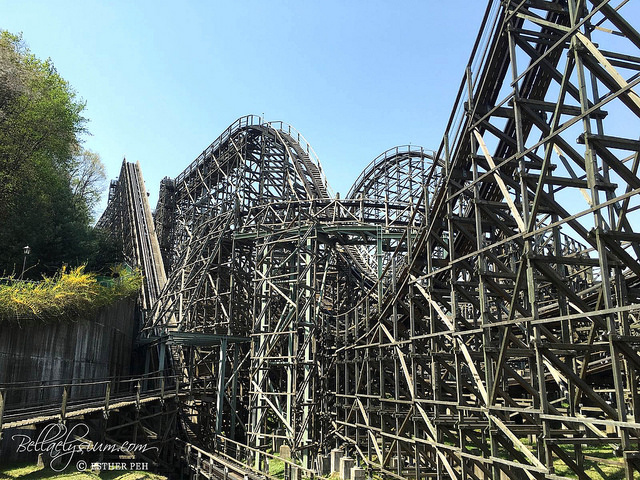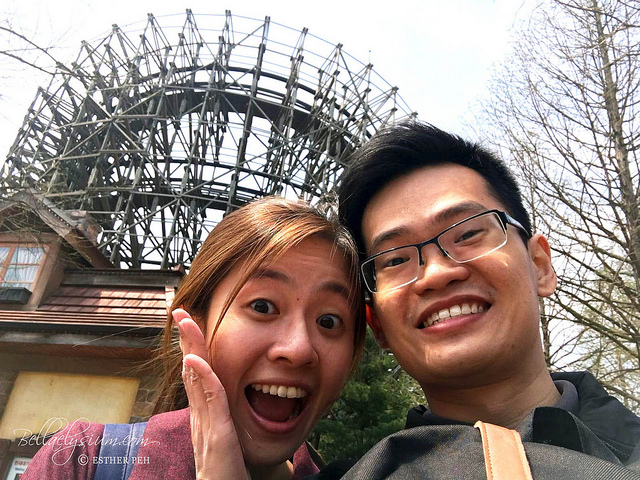“Hey Esther, want to meet up on Saturday night for some catch up?”
“Hi Esther, you are invited to attend our social event on Friday night. Please RSVP.”
“Hi Esther, want to go for night cycling? It will be fun!”
Most of the time, I had to politely decline. I did not explain why because it will be so difficult to explain my condition while avoiding many questions asked. Some will assume that I am just arrogant and ignorant of their feelings as I decline their invitation without explaining why. Well, it is kind of my fault actually. But when you are going through a very difficult journey, sometimes it is so difficult to accept your own situation, much less trying to explain to others.
As I am typing this post which has been in my draft for quite some time, I hesitate once in awhile wondering if I am making the right choice to write my story. There is always a fear in me that people will judge me and look at me differently, a small psychological effect that stemmed from childhood bullying. I suffer from a silent rare disease, Usher Syndrome, that will slowly rob my eyesight and affects my hearing. You can read here on how I discovered that I have Usher Syndrome, one of the rare genetic diseases that cause deafblindness.
Usher syndrome is the genetic condition that affects both hearing and vision. A syndrome is a disease or disorder that has more than one feature or symptom. The major symptoms of Usher syndrome are hearing loss and an eye disorder called retinitis pigmentosa, or RP.
I have talked about how I adapt to my loss of hearing which occurred from birth here: A glimpse into my silent world: I can see you speak
I thought that writing this post of my journey to discovering Retinitis Pigmentosa (RP) can give people a glimpse of how Retinitis Pigmentosa is like, so that one can understand the world of people with RP.
Retinitis pigmentosa (RP) is a rare, inherited disease in which the light-sensitive retina of the eye slowly and progressively degenerates.
When RP first starts to appear, the light-sensing cells that are responsible for vision in dim light (rods) gradually deteriorate and seeing at night becomes more difficult. During later stages of retinitis pigmentosa, only a small area of central vision remains, along with slight peripheral vision.
Disclaimer: This is based on my own story, and it will not be an accurate representative for all those who suffered from RP as different people have different level of RP due to the slow progressive nature of the disease.
* * *
Decreasing night vision
Poor night vision is one of the most common early symptoms for RP sufferers. I have trouble seeing at night ever since I was thirteen. I would stumble once in a while and walk very slowly at night. I avoided going to the dimly-litted cinemas most of the time unless I go with my family. I detest going for compulsory night camps in school because it was so difficult navigating my way around. However, I used to wave it off as Vitamin A deficiency, and never gave a thought about it.
Then when I was 20, something happened when I was attending a university night camp. We were playing the miming game, passing “message” along to the last person who had to get it right. Before my fellow mate could pass on the message to me, suddenly, everything went dark. All I could see was his face. I could not see his hands as he mimed the message, and I got really scared. My heart was racing, and I was really panicking inside and my mind went blank.
“Why can’t I see his hand? What is going on? What is wrong with my eyes?”
Thanks to the quick thinking of my senior, he asked me to sit down and continue the rest of the game. My eyes went back to normal after a while. Despite feeling panicky, I put this incident to the back of my mind. Maybe I am just tired.
As I am losing my night vision, things get darker too. I set my computer screen to brighter setting as time passes. I commented to my husband why the TV is getting less bright (he said it is quite bright). I even had to install a mini led light at his home’s kitchen because it is too dark for me to do my cooking.
Sensitive to bright light and glare
Pretty irony isn’t it? My night vision is diminishing, and yet I am extremely sensitive to bright lights and glare. My eyes hurt real bad when it get too sunny. I had to squint and focus to see what is in front of me while the glare blinded me temporarily. Then finally, I had to resort to getting a pair of transition lens for my own safety.
Losing my peripheral vision = “Tunnel Vision”
Things got noticeably worse as the years go by. I started to get very clumsy. I will trip over or knock onto obstacles along my path, be it the cleaning yellow signage on the floor or the train platform seat (which its color is exactly like the flooring of the platform). I kick the small dustbins at home without even noticing that they are there, basically, I kick anything that is not in my narrow view of vision! I trip over the shopping baskets on the floor of the supermarket. I knocked against low-lying tables. I stumbled when I missed seeing the drain. I miss out people just right in front of me, and they just cannot believe that I did not see them. I get bruises all over my legs without knowing why and how I got them. I even got myself burnt a couple of times when I am cooking as I did not notice the hot pots/pans beside me. I am quite accident-prone!
There is one time when my uncle is just right in front of me and I just walk straight into him! The look of disbelief when he asked if I really could not see him, I was really flustered!
Example of tunnel vision (My vision is not as bad as this one, but it’s a similar concept) – Adapted from news-medical.net
It only came as a realisation that I am losing my peripheral vision after I decided to get my eyes checked because of my poor night vision. I was 23 then. There were couple of tests that I went through which I will talk about them in my later post. One of them was the visual field testing using Goldmann Perimetry method.
In visual field test, I have to watch out for a dot of light which moves around directly in front of me and to either side of my head. Then I have to push a button to indicate that I can see the light. This process results in a map of my visual field and my central vision.
Apparently, it appeared that I was not able to see the roving light at either side of my head. My husband was with me at that time and he told me that I totally miss out the roving light at the outer region so the area of my vision is pretty small. So yes, I am losing my side vision. Now, it is much more pronounced. Instead of being able to see the sides, all I see is the black static around my vision. It is pretty annoying!
Reason is because, my rods and cones are dying. The doctor did show me the image of my retina. It is like black particles spotting (dying rods and cones) around my retina. Back then, it was really frightening knowing that my eyes’ cells are dying and I am helpless about it.

Adapted from cnn.com
Because of my restricted visual field, I avoid crowds and social events now. Being in crowded places, people walking by so fast that it is a blur to me and I will knock onto people who are not in my field of vision especially my sides as I have lost most of my side vision. In social events, I often miss seeing the oncoming handshakes. My husband who is often with me, will nudge and guide my hand most of the time, bless him!
There was an incident where I really did not notice someone pushing her pram and I just went BAM and knocked onto it. I have never felt so embarrassed in my whole life!
I avoided crowded restaurants. I have to watch for the tables, the chairs and the crowd while trying to navigate my way slowly. It is so stressful trying to memorize the placements of furnitures quickly before entering into the place
Depth Perception is reduced
Then one day, another horrible realization hit me. RP has also affects my depth perception. I am unable to walk down the stairs as fast as in the past. Looking downwards at the flights of stairs is like looking down at the flat path.
Nowadays, I will look sideways to check the depth of the stairs as I slowly make my way down, unless the edges of stairs has contrasting colours.
You know those same-colored steps with no visible line at the edges? I see it as a straight flat path downwards instead, no kidding!
Once, I fell and sprained my ankle because I failed to notice a short flight of stairs in front of me as the steps are of the same colour. My boyfriend (now husband) had to piggyback me to the train station for me before I hobbled my way home. The incident sparked a little phobia inside me, and now I will slide my foot instead to check where the edge as I step down. I avoided stairs whenever I could and would take the wheelchair-friendly slope or lift if there is one. Familiar places like my neighbourhood or my workplace, I memorized the number of steps by heart and hence, I just mentally count as I walk the steps down.
Learning to adapt
People ask me if I will go blind, or is there any cure. Unfortuntely, there is no curable treatments, and my disease will progress with time. I may not go completely blind (I hope!), but I will lose my side vision progressively. So I am trying to take care of my eyes as much as possible!
I wear transition lens whenever I am out in the sun. I put the blue guard film on my phone to protect my eyes from screen light. I cut down my art and crafts as they required detailed attention. My husband often keep check of my computer and phone screen to make sure that I do not brighten the screen subconsciously. He can get pretty naggy when he finds my screen too bright!
My husband and I have developed hand holding signals over the years. We hold hands whenever we go out, and he will give a hand squeeze to notify me beforehand that there is a platform ahead of me. When there is a flight of stairs, he will extend his arm to block me until I realise before we proceed our way down. Pretty much like my bodyguard, isn’t it?
As my eyesight get worse, I avoid going to unfamiliar places, especially crowded places. Walking my way through the crowd is never easy. Always, I hold my breath and walk pretty slow as I concentrate not to bump into people. My own family often joke and call me slow tortoise. But my brother can get really sweet where he will walk very slowly behind me to ensure that I am walking okay. My sister will let me hold onto her arm as she guides me along. My mother will just grab hold of my arm and kind of ‘drag’ me along!
When there is a social event somewhere unfamiliar, I will either drag my husband with me or I will visit the place days before just to memorise the route. Navigating in the night alone is my biggest nightmare, and the most challenging. I watch for landmarks, memorise the turns, anything that can get me from one familiar place to another. I always love sitting in SMRT buses because they have LED display screen to tell me where it is heading to. SBS buses should start implementing that strategy!
Unfamiliar places? My husband becomes my “walking stick” (Thanks, Husband!)
I have to switch my career interests many times, but thankfully, I love my full-time job because of wonderful colleagues who really help me out when my condition restricts me in some ways. I am forbidden by family and doctor to learn driving, how I wish that I learn driving before I got diagnosed! I have to take a break now and then from my art hobbies to rest my eyes. I have to ask my husband the colours when I could not differentiate the shades. Yes, retinitis pigmentosa is making me color blind as well, but hey, not as bad as it seems!
I have lost two friendships over the years when I got into depression after my first diagnosis and started to decline social invitations or gatherings. It was quite a pity but at the same time, I am also very grateful for people around me who are mindful and flexible enough to cater to my needs like arranging for meet up over lunch, or meeting near train stations over dinner so that I can get home just fine. Kind souls will escort me all the way home, right below my block!
Such friendships are rare and I am always grateful to meet such wonderful people!
So next time, if you see me across the street and I did not wave at you with a hi, high chance is that I might have miss you from my narrow vision. Just give a big wave and you will catch my attention!

T-Express in Korea
Life is like a rollercoaster – there are always ups and downs.

Took the T-Express and we did it!
All you need to do is to be brave and crazy enough take the ride!
